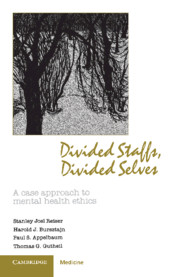Book contents
- Frontmatter
- Contents
- Acknowledgments
- About the authors
- 1 Introduction
- 2 New problems, new ethics: challenging the value structure of health care
- 3 Conflict and synthesis: the comparative anatomy of ethical and clinical decision making
- 4 Solving clinical puzzles: strategies for organizing mental health ethics rounds
- CASES IN MENTAL HEALTH ETHICS
- I Informed consent, competency, and involuntary treatment
- II Confidentiality
- III Truth-telling
- IV Managing difficult patients
- V Parents and children
- VI Religion and mental health treatment
- VII Allocation of resources
- VIII Research
- IX Mental health and medical illness
- X Mental health and criminal justice
- Bibliography
- Index
X - Mental health and criminal justice
from CASES IN MENTAL HEALTH ETHICS
Published online by Cambridge University Press: 06 July 2010
- Frontmatter
- Contents
- Acknowledgments
- About the authors
- 1 Introduction
- 2 New problems, new ethics: challenging the value structure of health care
- 3 Conflict and synthesis: the comparative anatomy of ethical and clinical decision making
- 4 Solving clinical puzzles: strategies for organizing mental health ethics rounds
- CASES IN MENTAL HEALTH ETHICS
- I Informed consent, competency, and involuntary treatment
- II Confidentiality
- III Truth-telling
- IV Managing difficult patients
- V Parents and children
- VI Religion and mental health treatment
- VII Allocation of resources
- VIII Research
- IX Mental health and medical illness
- X Mental health and criminal justice
- Bibliography
- Index
Summary
ON PROBATION
The validity of a patient's consent to share medical data with legal authorities.
The patient is a paranoid schizophrenic male in his 20s who was first admitted several years ago by his mother after she found him sitting in the kitchen at 3 a.m. with the gas jets on the stove turned up full. The patient stated he turned the stove up to keep warm and hadn't noticed the house being filled with gas fumes.
The patient had dropped out of school at the age of 16 and experienced gradual withdrawal accompanied by poor concentration and auditory hallucinations; he had spent most of the year prior to his first admission alone in his room listening to music. In the past 2 years the patient has been admitted to the hospital eight times. Typically, he would request admission because of hearing voices and worrying about losing control. He would recompensate fairly rapidly, become involved in ward activities, then would deny that he had any problems, sign a self-discharge paper, and leave the hospital. Of these admissions, five have been voluntary, one civil involuntary, and two based on court orders for seemingly impulsive criminal acts, which tended to occur shortly after the patient stopped taking his medication.
Most recently he threw a brick through a police car window and was consequendy sent by the court for psychiatric evaluation. The hospital found him competent to stand trial and recommended further inpatient treatment and medications.
- Type
- Chapter
- Information
- Divided Staffs, Divided SelvesA Case Approach to Mental Health Ethics, pp. 127 - 136Publisher: Cambridge University PressPrint publication year: 1987

